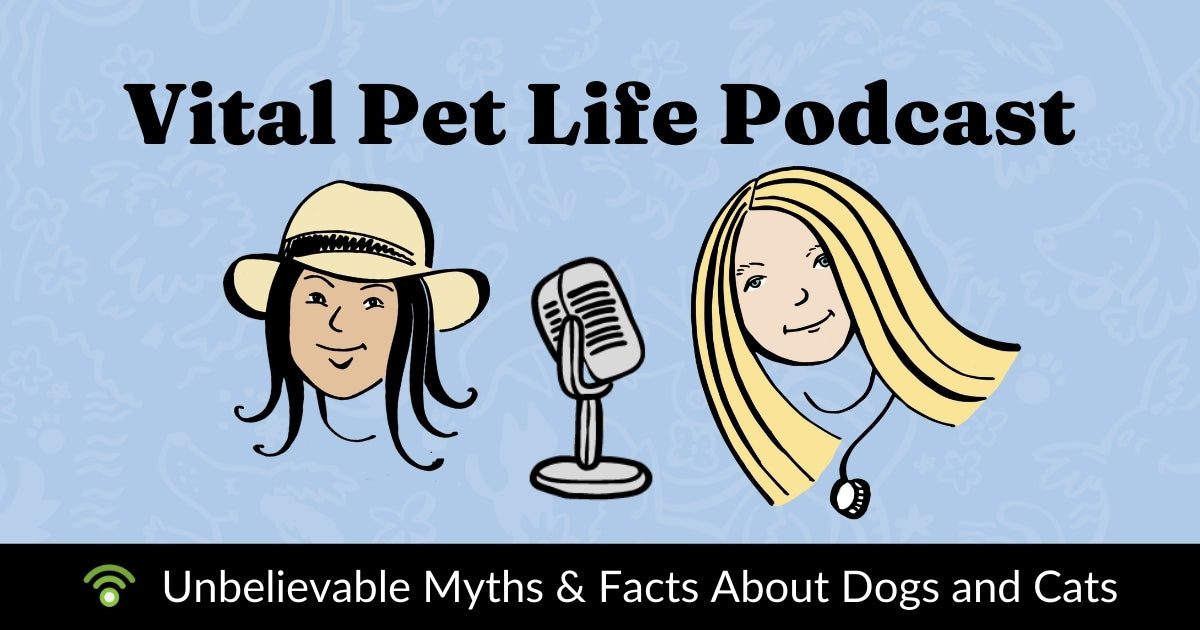
Vital Pet Life Podcast: Unbelievable Myths & Facts About Dogs and Cats
November 21, 2024Welcome to another exciting episode of our podcast! We're diving into common misconceptions about pet care and determining whether they're myths or facts. Hosted by Dr. Amber, our resident veterinarian at Vital Pet Life, and Donie, our Chief Treat Lady. Let’s explore these intriguing topics together and see what’s true and what’s not regarding our furry friends.
We break down several common beliefs about pet health and behavior, covering topics from spaying female cats to the infamous warm noses of a dog. Dr. Amber shares her expert knowledge, debunking myths and providing valuable insights into what’s best for our pets. Whether you’re a new pet parent or a seasoned pro, there’s something in this episode for you.
Should Female Cats Give Birth Before Being Spayed?

Dr. Amber laughs at this widespread myth and sets the record straight: unless you’re breeding high-quality purebred cats, it’s best to spay your female cats before they give birth. Spaying early helps control the overpopulation of cats and prevents various health issues. Dr. Amber emphasizes that letting a cat give birth first is outdated and not backed by veterinary science.
Does a Warm and Dry Nose Signal Fever in Dogs?

This one might surprise you—it’s a myth! Dr. Amber explains that a dog’s nose temperature can vary for many reasons and isn’t a reliable indicator of fever. A dog’s average body temperature is naturally higher than a human’s. So, if you’re concerned about your dog’s health, it’s better to rely on other signs, like lethargy or lack of appetite, and, of course, use a thermometer to be sure.
Should Cats Be Given Cow’s Milk?

We’ve all seen the cute images of cats lapping up milk, but Dr. Amber advises against it. Cow’s milk is higher in sugar and lacks the nutritional balance cats need, making it a poor choice for regular consumption. Better alternatives, such as commercial milk replacers designed to meet their nutritional needs without upsetting their stomachs, are available for orphaned kittens.
Can Dogs Safely Eat Chocolate?

This common myth couldn’t be further from the truth. Dr. Amber warns that chocolate contains theobromine, which is toxic to dogs. Even a small amount can cause vomiting, diarrhea, and even more severe symptoms like seizures. Always keep chocolate away from your furry friends, no matter how much they beg.
Is Garlic Good for Dogs?

Dr. Amber debunks this myth by explaining that garlic, onions, and chives are toxic to dogs. While some believe that small amounts of garlic can have health benefits, the risks far outweigh any potential advantages. Garlic can cause gastrointestinal upset and even lead to more serious health problems, so it’s best to keep it out of your dog’s diet entirely.
Does Fish Oil Improve a Dog’s Coat?

This one is a fact! Dr. Amber confirms that fish oil, rich in omega-3 fatty acids, can improve your dog’s coat, making it shinier and healthier. However, she advises pet owners to consult with their vet before adding supplements to their dog’s diet to ensure the right dosage and to avoid any potential side effects.
Do Cats Always Land on Their Feet?

This is a well-known myth, and Dr. Amber explains that cats have an incredible ability to right themselves during a fall but don’t always land on their feet. Cats can sustain serious injuries if they fall from a great height, so keeping windows closed or securely screened is important to prevent accidents.
Is a Dog’s Mouth Cleaner Than a Human’s?

This common belief is a myth. Dr. Amber explains that while dogs and humans have bacteria in their mouths, they are different. A dog’s mouth isn’t necessarily cleaner than a human’s, and dog bites can introduce harmful bacteria. Wash your hands after playing with your pet is always a good idea, especially if they’ve licked you.
Does Eating Grass Mean a Dog Is Sick?

This is another myth. Dr. Amber points out that while some dogs eat grass when feeling unwell, many do it simply because they like the taste or the texture. It’s not necessarily a sign of illness, but if your dog eats grass frequently or seems unwell, it’s worth discussing with your vet.
Do Cats Purr Only When They’re Happy?

Contrary to popular belief, cats don’t just purr when happy. Dr. Amber explains that cats also purr when scared, in pain, or even trying to comfort themselves. Purring is a complex behavior, and while it often indicates contentment, it can have other meanings, too.
This episode also discusses the importance of choosing the proper diet for your pets. Dr. Amber suggests that treats should be in moderation and that human food, especially table scraps, should be avoided to prevent obesity and other health issues. For cats and dogs alike, a high-quality, well-balanced diet is crucial for maintaining their health and happiness.
Conclusion:
To wrap up, we debunked several myths many pet owners believe, from spaying practices to what’s safe for your pets to eat. Dr. Amber’s advice is clear: stay informed and consult your vet to ensure your pets get the best care possible. For more detailed insights, be sure to listen to the full episode!
Thank you for joining the Vital Pet Life Podcast. We are committed to providing valuable information to ensure the health and happiness of pets.
Click here to subscribe to Vital Pet Life for more insightful discussions and practical tips. Until next time, stay informed and keep your pets thriving!
